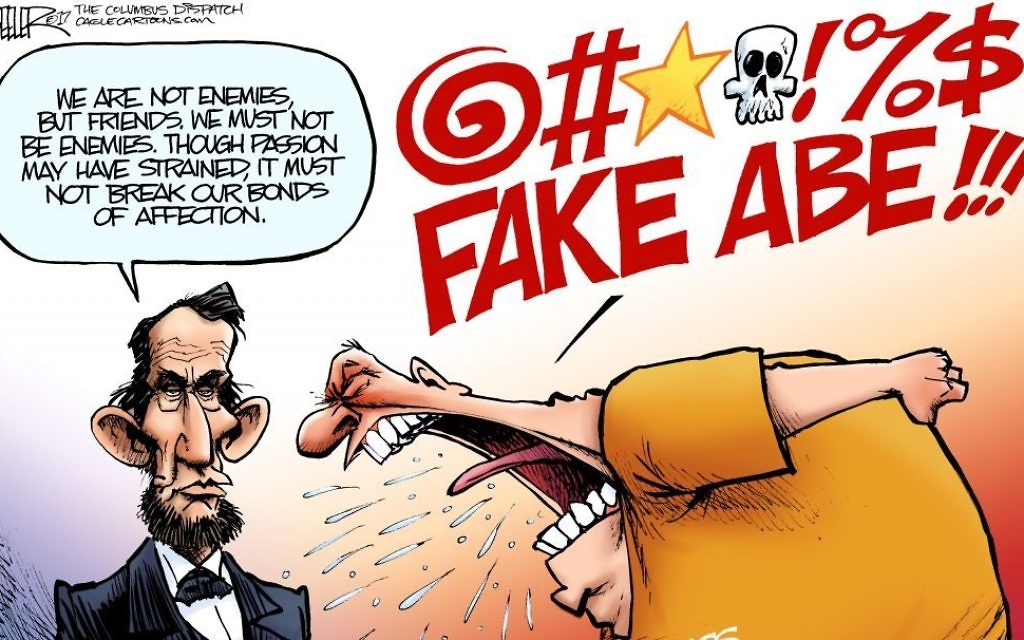What News Is and Isn’t ‘Fake’
Don't reject an article just because it doesn't match your view of the world.
When Dan Shapiro, the former U.S. ambassador to Israel, addressed the annual meeting of the Jewish Federation of Greater Atlanta, he delivered a 45-minute explanation of Obama administration policies related to Israel, Iran and other issues.
No doubt there were those in the audience who silently scoffed at Shapiro’s interpretation of events and had virulently disagreed with the policies of the Obama administration, but nothing the ambassador said was “fake news.”
A few days later, before CNN anchor Wolf Blitzer delivered the annual Eizenstat Family Lecture at Ahavath Achim Synagogue, Rabbi Neil Sandler delivered a d’var Torah about what some suggest was the original case of fake news.
Get The AJT Newsletter by email and never miss our top stories Free Sign Up
Rabbi Sandler discussed the Torah portion Shelach, the story of how Moses dispatched spies, each a chief of one of the 12 tribes, to assess the land of Canaan while the Israelites were in the wilderness after fleeing Egypt.
Ten returned with negative reports.
“They spread an (evil) report about the land which they had scouted, telling the children of Israel, ‘The land we passed through to explore is a land that consumes its inhabitants, and all the people we saw in it are men of stature. There we saw the giants. … In our eyes, we seemed like grasshoppers, and so we were in their eyes.’ ” (Numbers 13:32-33)
Two of the spies reported positively.
“If the Lord desires us, He will bring us to this land and give it to us, a land flowing with milk and honey, that the Israelites could take land in Canaan with G-d’s help.” (Numbers 14:8)
The negative reports, Rabbi Sandler said, were fake news, misinformation that was accepted as true — “The entire community raised their voices and shouted, and the people wept on that night” (Numbers 14:1) — causing G-d to punish the Israelites with 38 more years wandering in the wilderness before Joshua, one of those who delivered a positive report, led them into the Promised Land.
I share a lament expressed by Gary Rosenblatt, the editor of New York Jewish Week, about “the combination of self-righteous nastiness and confusion over what’s news and what’s opinion, what’s real and what’s fake.”
Rosenblatt’s comment was prompted by a letter to the editor critical of a column he wrote regarding American Jews, Israel and President Donald Trump, but it applies to discourse over any number of subjects.
As a freelancer, I write a biweekly column for the Atlanta Jewish Times, From Where I Sit, that appears under a banner reading “opinion.”
I also write long-form articles that appear under a banner reading “news.”
“Fake news” includes the adventures of “Bat Boy” in the Weekly World News, the nonsense in The Onion and the dubious reports during last fall’s election campaign on websites operated by young people in Macedonia.
Information reported by reputable news organizations is not “fake news” merely because it does not support your view of the world. And, yes, liberals are as likely as conservatives to dismiss information that does not concur with their opinions.
I have lost patience with those who spout off about “the news media is this, the news media is that,” tarring with a broad brush, no different from someone who complains about all lawyers or mechanics or teachers.
My professional life began at a midsize Midwestern daily on a Monday in June, a year short of 40 years ago. I may not have expected to be writing primarily for Jewish media at this point in my career, but I appreciate the freedom that this column provides to offer my perspective and the opportunity to write articles on topics of interest and import.
The Atlanta Jewish Times brings you “real news” and diverse opinions. The American Jewish Press Association has honored the AJT with a prize for enterprise or investigative reporting for articles on how heroin has taken the lives of Jewish young people in Atlanta. Journalism of this sort is why Atlanta’s Jewish community is fortunate to have an independently owned newspaper, and it behooves the community to subscribe and support that voice.





comments